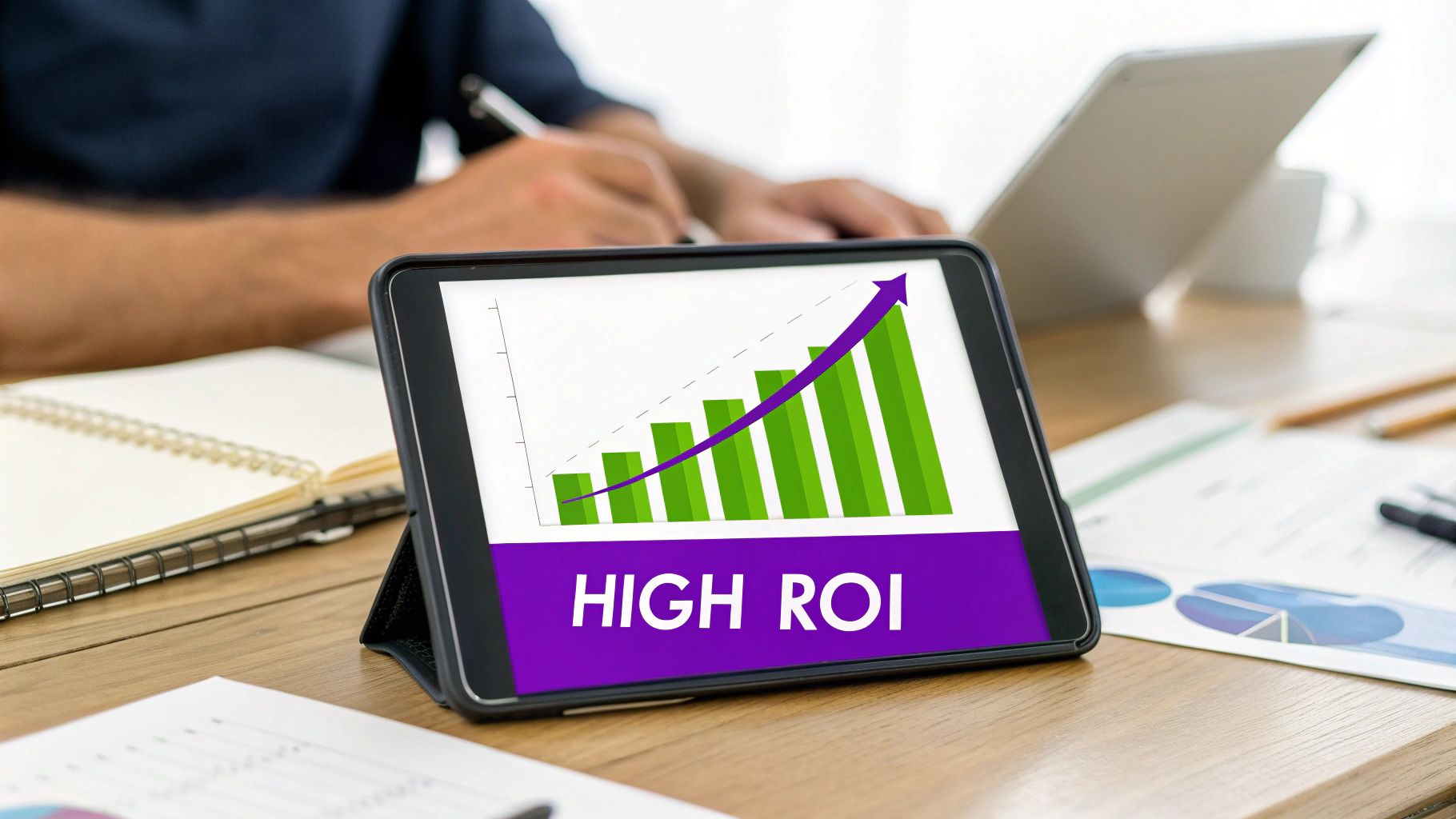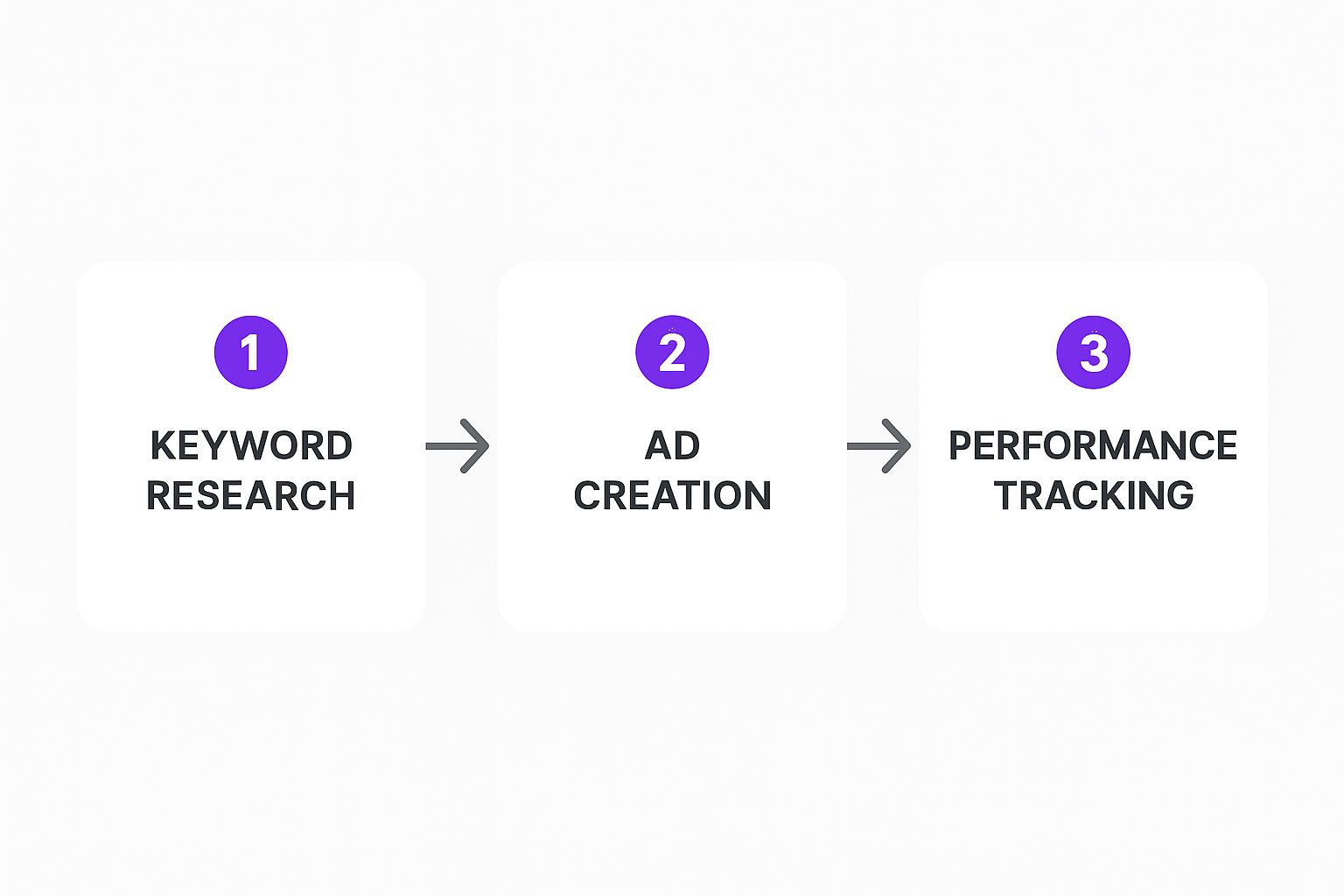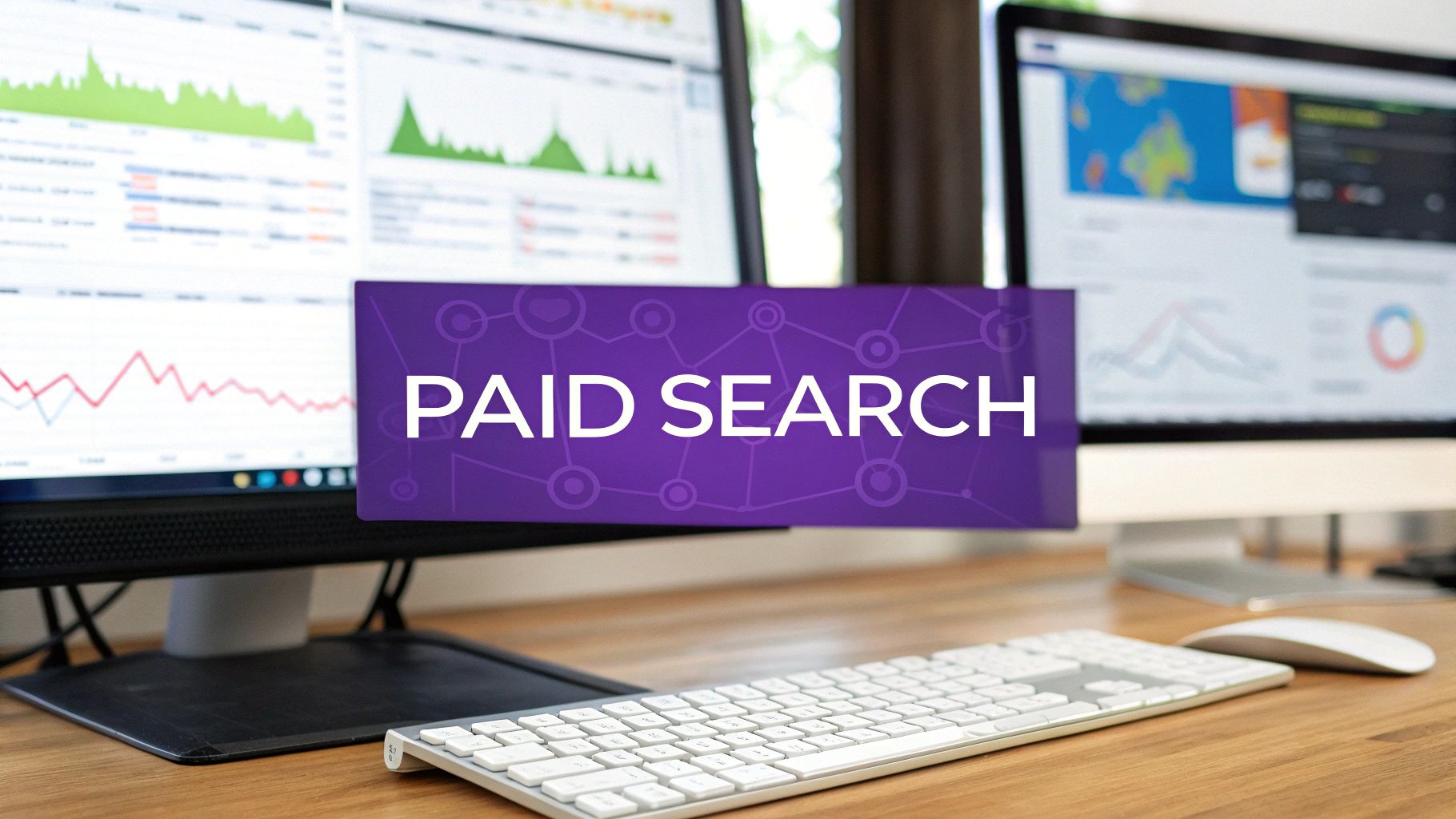Paid Search Services for Quick Business Growth
Paid search services are your shortcut to getting in front of customers at the exact moment they’re looking for what you sell. It’s all about hiring pros to manage your ad budget on platforms like Google, landing you prime real estate in the search results and sending a flood of ready-to-buy traffic your way, fast.
What Exactly Are Paid Search Services?

Picture a massive, bustling digital marketplace. Every single person there is actively shouting out what they want to buy. Paid search services act as your expert guide, putting your business directly in their path right when it matters most. You get to skip the months-long wait for organic SEO traffic and get seen now.
Here’s a simple way to think about it: SEO is like building your own beautiful storefront from the ground up in a great neighborhood. It takes time, effort, and patience. Paid search, on the other hand, is like renting a pop-up kiosk right at the main entrance of the busiest mall on Black Friday. You pay for the premium spot, but you start making sales the minute you open for business.
The Foundation of Paid Search
At its heart, paid search runs on a Pay-Per-Click (PPC) model. Simple, right? You only open your wallet when someone is interested enough to actually click on your ad. This performance-based setup makes it an incredibly efficient way to spend your marketing dollars. For a deeper dive into how this all works, check out this great explainer on What is Pay Per Click (PPC)?.
The whole system is basically a lightning-fast, automated auction. Every time someone types a search query, an auction happens in milliseconds to decide which ads show up and in what order. A professional paid search services provider navigates this complex auction for you, making sure your ads don't just show up—they win. You can see how we manage this entire process in our full guide on paid search strategies.
Why It's a Marketing Cornerstone
You can’t argue with the numbers. In the U.S. alone, paid search ad spend is expected to rocket to $124.59 billion in 2024. That’s an 11.1% jump from last year.
This channel is now responsible for about 23% of all website visits, cementing its spot as a primary driver of high-intent traffic. The sheer amount of money being poured into paid search shows just how essential it is for any business serious about growth.
So, what does a professional service actually do? They manage a few key moving parts to make the magic happen:
- Keyword Research: This is all about getting inside your customers' heads to find the exact phrases they’re typing into Google.
- Ad Copywriting: It's a mix of art and science—crafting short, punchy ads that grab attention and get the right people to click.
- Bid Management: Strategically managing your auction bids to get the best possible ad placement for the lowest cost, making every dollar count.
- Performance Tracking: Constantly digging into the data to see what’s working and what’s not, then tweaking the campaigns to squeeze out even better results.
What's the Real Advantage of Professional PPC Management?
So, you can launch your own ads. Big deal. The real magic isn't in just launching them; it's about turning your ad budget into a finely tuned engine that spits out measurable growth from day one. Hiring pros gives you an immediate leg up, letting you leapfrog the painfully slow climb of organic SEO.
Think of it like this: SEO is planting an orchard. You pour in time, effort, and patience, and eventually, you get a beautiful, fruit-bearing asset that lasts for years. Professional paid search services? That's like hiring an expert farming collective that shows up with a truck full of ripe fruit tomorrow morning. You get immediate results, generating leads and sales while your long-term strategies are still putting down roots.
Get Seen. Instantly.
One of the most undeniable perks of professional management is speed. A new business or a fresh product can spend months, even years, clawing its way up the search rankings, completely invisible to customers. Your competitors, with their established websites, will just keep dominating page one.
Paid search flips that script entirely. A well-oiled campaign can rocket your brand to the very top of the search results for your most valuable keywords, often within hours. This isn't just about getting clicks—it's about snatching immediate mindshare and forcing your way into the customer's decision-making process right when it matters most.
When you bring in experts for paid search, you're not just buying ads—you're buying immediate relevance. You get to inject your solution directly into a customer's brain at the exact moment of their highest intent.
This kind of instant visibility is a game-changer for businesses that need to make a splash now. Think product launches, seasonal promos, or breaking into a new market. It delivers that critical first wave of traffic and data you need to start refining your pitch and proving your concept.
Stop Shouting into the Void: Reach the Right People
Generic advertising is like casting a massive fishing net into the open ocean. Sure, you might catch something, but you'll mostly just waste a ton of energy and pull up old boots. Professional paid search is more like spear fishing in a crystal-clear stream. You see your target, you aim, and you hit it with surgical precision.
Experts use ridiculously granular targeting to make sure not a single penny of your ad spend is wasted on the wrong people. They go way beyond basic keywords, layering on multiple targeting criteria to build a highly specific profile of your perfect customer.
This lets you get incredibly focused. For instance, a B2B software company can target users by:
- Job Title: Showing ads only to "Marketing Directors" or "Chief Financial Officers."
- Company Size: Focusing on businesses with 50-200 employees.
- Industry: Making sure their ads are only seen in the manufacturing or healthcare sectors.
Meanwhile, an e-commerce brand can get just as specific, targeting based on:
- Past Purchase Behavior: Re-engaging customers who’ve already bought from them.
- Specific Interests: Reaching users who are into complementary things like hiking gear or sustainable fashion.
- Demographics and Location: Pinpointing users in specific affluent zip codes or age brackets.
This level of precision means every dollar you spend is aimed squarely at someone with a high probability of converting. It transforms your ad budget from a speculative gamble into a calculated investment. Professional management stops the broad, hopeful shouting and starts a direct conversation with the people most likely to become your next best customers.
What Are You Actually Paying For? A Look at Core Paid Search Services

When you hire a pro for paid search, you're not just "buying some ads." Let's get that straight. You're bringing in a specialist to run a nonstop cycle of strategy, testing, and optimization designed to turn your ad budget into actual business growth. Every single deliverable is a piece of a much larger, interconnected puzzle.
Think of it like hiring a master chef. You aren't just paying for groceries; you're paying for their expertise in sourcing the best ingredients (keyword research), creating the perfect recipe (ad copy), managing the heat (bid management), and plating it all beautifully (landing page experience). Each step is critical.
The numbers don't lie. The global paid search market is on track to hit a mind-boggling US$351.55 billion by 2025, with companies spending over $58 per internet user to get in front of the right people. Platforms like Google Ads alone command a 29% market share. This isn't pocket change; it's a high-stakes game that requires serious skill. If you want to dig deeper into the trends, check out these insightful PPC statistics.
H3: Foundational Keyword Research and Strategy
Everything—and I mean everything—in paid search starts with keywords. This is the bedrock of your entire campaign. A real pro doesn't just pull a few popular terms out of a hat. They perform a deep, data-driven investigation to unearth the exact phrases people are typing into Google when they’re ready to pull out their credit card.
This goes way beyond just finding high-volume words. It’s all about nailing user intent. Someone searching for "best running shoes for flat feet" is in a completely different headspace than someone searching for "history of running shoes." One is looking to buy; the other is writing a school paper.
A seasoned expert focuses on targeting those high-intent keywords to make sure your ads show up for people actively looking for the solution you sell. This strategic groundwork is the single most important step in preventing wasted ad spend right from the jump.
H3: Compelling Ad Copy and Creative Development
Once you’ve got the right keywords, the next hurdle is writing an ad that people will actually click. Your ad is a tiny billboard on a massively crowded highway. A professional service brings years of experience in writing tight, persuasive copy that speaks directly to what the user just searched for.
This isn't just about stringing together a few clever words. It's a specific craft that involves:
- Highlighting Your Unique Selling Propositions (USPs): What makes you the obvious choice over the other guys?
- Including a Strong Call-to-Action (CTA): Telling the user exactly what to do next, like "Shop Now" or "Get a Free Quote."
- Optimizing Ad Extensions: Using every tool in the box—sitelinks, callouts, structured snippets—to make your ad bigger, more helpful, and way more clickable.
A great ad closes the gap between a user's problem and your solution in just a few lines of text. It confirms they've found what they were looking for and makes clicking the obvious next step.
Top-tier agencies are also constantly running A/B tests. They'll pit multiple ad versions against each other to see which headline, description, or CTA gets the best results. This data-backed process means your messaging is always getting sharper and more effective, leading to higher click-through rates and better Quality Scores.
H3: Strategic Bid Management and Budget Optimization
This is where a professional paid search service truly earns its keep. The ad auction is a wild, dynamic marketplace where costs can swing dramatically in minutes. Without an expert watching over it, it’s ridiculously easy to overpay for clicks or, even worse, miss out on valuable traffic altogether.
Bid management is both an art and a science. It's about setting the perfect price for every potential click. A dedicated manager will constantly tweak your bids based on a ton of different signals:
- Time of day and day of the week
- The user's device (mobile vs. desktop)
- Geographic location
- Keyword performance
This continuous fine-tuning ensures your budget is funneled toward the campaigns, keywords, and audiences that are actually performing. It's about stretching every dollar as far as it can possibly go. They actively stop you from pouring money into clicks that don't convert and redirect those funds to the ones that do. This meticulous financial oversight is a core deliverable that directly fattens your bottom line.
From Kickoff to Conversion: A Campaign Journey
A professionally managed paid search campaign isn’t something you just set and forget. It's a living, breathing process. Think of it less like flipping a switch and more like piloting a sophisticated aircraft—it requires constant tweaks and adjustments to navigate changing conditions and actually land at your destination.
The whole thing kicks off with a deep-dive discovery phase. This is where a paid search services provider really gets under the hood of your business to understand your goals, your ideal customer, and where you fit in the market. This initial strategy session is everything; it sets the coordinates for the entire campaign, making sure every dollar spent is pulling in the same direction.
The Strategic Blueprint and Account Setup
With a clear strategy locked in, the next step is building the skeleton of your ad account. This is the architectural phase, where the campaign's blueprint is drawn out. It involves carefully organizing campaigns and ad groups into a logical structure that mirrors your products, services, and the different types of customers you're trying to reach.
Why does this structure matter so much? A few key reasons:
- Budget Control: It lets you precisely allocate your ad spend to the parts of your business that are actually making you money.
- Relevance: It ensures your ads and landing pages are tightly connected to specific keywords, which is a massive factor in boosting your Quality Score with Google.
- Performance Tracking: A clean structure makes it a thousand times easier to analyze the data and see which parts of the campaign are crushing it and which are duds.
This methodical setup prevents the chaos of a messy, disorganized account where the data is a muddled mess and trying to optimize is a shot in the dark. It’s the difference between a well-organized library and a messy pile of books on the floor.
The Creative Spark and Strategic Launch
Once that foundation is solid, the creative work begins. This is where we bring the campaign to life, following a pretty straightforward flow.

This visual nails the essential cycle: keyword research informs the ads you create, which then feeds performance data back into the system, creating a continuous loop of improvement. The process moves from digging for the perfect keywords to writing snappy, compelling ad copy that grabs attention and makes people want to click. It’s not just about launching ads; it’s about launching the right ads to the right audience at the right time.
A campaign launch is not the finish line; it’s the starting gun. The moment ads go live, a new and arguably more important phase begins: the relentless pursuit of optimization.
That initial launch gives you your first taste of real-world data. It's the first chance to see how actual people interact with your ads and landing pages. This data is the lifeblood of the campaign, fueling every decision and strategic pivot from here on out.
The Cycle of Monitoring and Optimization
After launch, the campaign enters a non-stop cycle of monitoring, analysis, and tweaking. This is where the real expertise of a paid search service shines. A dedicated manager is practically living in your account every day, watching performance metrics like a hawk.
They’re focused on a handful of critical activities:
Performance Analysis: Digging into the data to see what’s working and what’s falling flat. This means tracking metrics like click-through rate (CTR), conversion rate, and cost-per-acquisition (CPA).
A/B Testing: Constantly running tests on different ad headlines, descriptions, and calls-to-action to find the winning combination that truly connects with your audience.
Bid Adjustments: Strategically changing bids based on device, location, time of day, and audience performance to squeeze every last drop of efficiency out of your budget.
Keyword Refinement: Adding new high-performing keywords and, just as importantly, weeding out irrelevant search terms (as negative keywords) to stop wasted spend and sharpen your targeting.
As you track your campaign's progress, understanding your Return on Ad Spend (ROAS) is crucial for maximizing profitability. This relentless cycle of testing and refining is what turns a good campaign into a great one. It ensures your investment is always working harder, driving better results over time and moving your business steadily toward its goals.
How to Choose the Right Paid Search Partner

Hiring someone to manage your paid search is one of the biggest marketing calls you'll make. You're not just finding a button-pusher who can run ads; you're handing over a piece of your company's growth to an expert.
Get it right, and your partner becomes a true extension of your team. Get it wrong, and you might as well light your budget on fire.
The key is to look past the slick sales pitches for real proof of expertise, total transparency, and a genuine stake in your success. Think of it like hiring a financial advisor. You wouldn't hand over your life savings without digging into their track record, communication style, and strategy. The same rule applies here.
This framework will help you vet potential agencies with confidence, so you find a partner who will treat every dollar of your ad spend like it’s their own.
Evaluate Their Industry Experience and Past Results
A top-tier agency does more than just "know" paid search. They need to have proven, in-the-trenches experience in your specific industry. The game plan for a local dentist is worlds apart from what a national B2B software company needs.
Look for hard evidence that they get the nuances of your market. This means asking for case studies and real-world examples of their work with businesses like yours. Don't let them get away with vague success stories; you need the specifics.
A truly great paid search partner won't dazzle you with vanity metrics like clicks and impressions. They’ll walk you through how they drove actual business outcomes—things like qualified leads, more sales revenue, and a killer return on ad spend.
When you’re talking to an agency, ask these questions point-blank:
- Can you show me a campaign you ran for a client in my industry?
- What were the specific challenges, and how did your strategy tackle them?
- What was the real, bottom-line business impact of your work?
Their answers will tell you everything you need to know about whether they have the specialized chops to win in your competitive space. A strong partner will be excited to show you their wins.
Prioritize Transparent Reporting and Communication
Vagueness is the single biggest red flag. You should never feel like your money is disappearing into a black box. A trustworthy agency operates with 100% transparency, giving you clear, regular reports that connect their actions directly to your business goals.
They should have a consistent reporting schedule—at least monthly—and be able to break down the data in plain English. The reports need to focus on metrics that actually matter, like cost-per-acquisition (CPA) and return on ad spend (ROAS), not just clicks.
Beyond that, communication should be proactive. You need a dedicated point of contact who's responsive and keeps you in the loop on campaign performance, strategy tweaks, and new opportunities. This is especially vital for campaigns designed to drive high-quality prospects, a core component we dig into in our guide to effective lead generation.
Look Out for Common Red Flags
Knowing what to avoid is just as important as knowing what to look for. Certain promises and practices should set off your alarm bells immediately.
Be wary of any agency that:
- Guarantees #1 Rankings: Nobody can guarantee the top ad spot. Ad position is decided by a live auction, and any agency claiming otherwise is flat-out lying.
- Offers a "Secret Sauce": Effective paid search is built on proven strategies and hard data, not some mysterious, proprietary formula they won't explain.
- Has Vague or Complicated Fee Structures: Pricing should be dead simple, whether it’s a flat retainer, a percentage of ad spend, or a hybrid model.
Picking the right partner for your paid search services comes down to finding an expert who gets your goals, communicates openly, and has a verifiable track record of delivering real, measurable results.
The Future of Paid Search and What It Means for You
The world of paid search moves at warp speed. What worked last year is already gathering dust as technology completely rewrites the rulebook. If you want to stay ahead, you have to understand where the game is going and get your strategy ready for what’s next.
A top-tier paid search services provider doesn't just run today's campaigns; they’re your guide to the future. The two biggest game-changers right now are automation and artificial intelligence (AI). These aren't just minor tweaks—they're fundamentally reshaping how ads are targeted, built, and optimized.
This shift is being driven hard by platforms like Google, which are all-in on automated bidding and dynamic ad formats. For instance, just switching to newer formats like Responsive Search Ads (RSAs) can boost clicks by 5-15%. How? By letting machine learning test endless combinations of headlines and descriptions to find what actually works. For a deeper dive, you can discover key insights on PPC statistics.
The Rise of AI and Automation
Modern paid search is less about manually twisting knobs and more about feeding the right data into a really smart machine. Google’s Performance Max campaigns are the perfect example of this in action.
These campaigns use machine learning to handle targeting, bidding, and ad creation across every single one of Google's channels—all from one setup. The whole point is to stop obsessing over rigid keywords and instead let the algorithm find customers who are ready to convert, wherever they happen to be.
This calls for a whole new kind of expertise. It's less about micromanaging bids and more about providing killer strategic inputs, like high-quality creative and crystal-clear business goals. A true expert knows how to steer these powerful automated systems to get incredible results.
The future of PPC management isn't about fighting automation; it's about mastering it. A great agency works with the algorithms, providing the strategic oversight and creative fuel they need to drive exceptional results.
This AI-first world also forces us to rethink how paid and organic strategies work together. They're different, sure, but understanding how they feed off each other is critical. For a clearer picture, check out our complete breakdown of paid search vs. SEO.
Privacy, Cookieless Tracking, and First-Party Data
Another tectonic shift is the industry’s move toward a more privacy-focused internet. With third-party cookies getting phased out, advertisers can no longer creepily follow users across different websites. This makes collecting and using your own first-party data—info you gather directly from your audience—non-negotiable.
This data, from email lists, your CRM, and website behavior, is officially your most valuable asset.
A forward-thinking paid search service will help you build and activate these audiences. The goal is to create super-relevant campaigns that respect user privacy while still crushing your performance goals. This isn't just a technical problem to solve; it's a strategic pivot toward building real trust with your customers. Your future success depends on how well you can use the data you actually own.
Got Questions About Paid Search? We've Got Answers.
Diving into paid search can feel like learning a new language, and it’s natural to have a few questions before you jump in. Getting straight answers is the first step to figuring out what a professional paid search service can actually do for your business.
Here are some of the most common questions we get asked—and our no-fluff answers.
How Long Until I Actually See Results?
This is the big one, right? While paid search can start sending clicks to your site almost immediately, turning those clicks into real business growth takes a bit of finesse. You’ll see the first wave of data within a few weeks, which is crucial for learning what’s working and what’s not.
But for consistent, positive returns? Give it 2-3 months. That’s the sweet spot for moving past the initial testing phase—where we’re tweaking ad copy, ditching dud keywords, and dialing in your bids—and into a smooth, optimized groove.
What's the Real Difference Between SEO and Paid Search?
Think of it like real estate. Paid search is like renting a massive, flashy billboard right at the entrance to the busiest mall in town. You pay, you get seen—instantly.
SEO, on the other hand, is like buying the land and building your own flagship store from the ground up. It takes time, effort, and a solid foundation, but eventually, you own a prime piece of property that brings in traffic for free.
Paid search gives you speed and control, perfect for making an immediate splash. SEO builds your brand’s long-term authority and trust. The smartest strategies almost always use both.
How Much Should I Actually Budget for This?
Your total investment really breaks down into two buckets:
Ad Spend: This is the money that goes directly to Google (or another platform) every time someone clicks on your ad.
Management Fee: This is what you pay an agency for their expertise—the strategy, the optimization, the whole shebang.
For a local business just getting started, a realistic ad spend might be $1,000-$2,500 a month. That number can climb much higher for competitive industries or national campaigns. As for management fees, they’re usually a percentage of your ad spend (around 10-20%) or a simple flat monthly rate.
Can You Guarantee Me the #1 Spot on Google?
Nope. And if anyone tells you they can, you should run for the hills.
Think of it this way: Google’s ad auction is happening live, thousands of times a second. Your ad’s position depends on your bid, the quality of your ad, and how relevant your landing page is. Promising the top spot is like guaranteeing you’ll win every single hand in a poker game—it's just not possible and a huge red flag.
What a great agency can guarantee is a smart, data-backed approach. We’re not focused on vanity metrics like being #1. We’re focused on getting you the best possible results for your goals and budget.
Ready to stop guessing and start growing? The team at Rebus has managed over $100 million in ad spend, turning marketing budgets into real, measurable revenue. Let's build a strategy that works.

